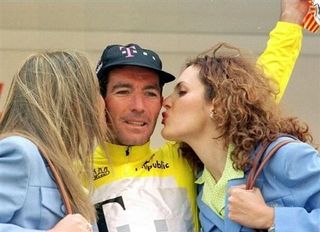Former Telekom rider confirms team doping in 1990s
By Susan Westemeyer Bert Dietz, who rode for Team Telekom from 1994 to 1998, has confirmed that team...

By Susan Westemeyer
Bert Dietz, who rode for Team Telekom from 1994 to 1998, has confirmed that team doctors provided EPO (Erythropoietin) and other illegal doping products to its riders. In an appearance Monday night on German television, he upheld the charges made by former soigneur Jef d'Hondt concerning the team doctors Andreas Schmid and Lothar Heinrich.
"When the doctors were there, they gave us the shots themselves," Dietz said on television program Beckmann. "When they weren't there, then the soigneurs did it, that is, Jef d'Hondt."
T-Mobile responded promptly to the allegations, referring to its new anti-doping program. "This is a rerun of concrete allegations," Christian Frommert, head of Sponsoring Communication for sponsor Deutsche Telekom, told Cyclingnews. "It becomes more and more clear that our [new anti-doping] course is very important and the only way to go. This is our way for the future, but we are looking at the past as well, together with Rolf Aldag and the current management."
Aldag, who was named Sport Director of the team last fall, rode for Team Telekom/T-Mobile from 1993 to 2005. He has claimed to know nothing about doping within the team and said that he never used the products.
Dietz rode for Telekom from 1994 to 1998 and for Team Nürnberger from 1999 to 2000. He was not on Telekom's winning Tour de France teams in 1996 or 1997 but he did win a stage of the Vuelta a España 1995.
He refused to say which other riders were involved. When asked specifically about Tour winners Bjarne Riis and Jan Ullrich, he responded "I am here to tell my story," saying that he didn't want to put the finger on anyone else.
Get The Leadout Newsletter
The latest race content, interviews, features, reviews and expert buying guides, direct to your inbox!
Dietz is now only indirectly involved with cycling, as he runs a sporting goods store. He does not expect any direct consequences for his confession, as might someone who is still active either as a rider or in management. "Other riders must be afraid of losing their job and never again being hired by a team," he noted.
If he wasn't willing to implicate his former teammates, he was ready enough to speak out against Schmid and Heinrich. At first it was cortisone. But in 1995, he said, the doctors told the riders about EPO.
"It was a training camp on Mallorca in the spring. The doctors were becoming more and more involved in our training plans, at the wish of Telekom. In individual discussions, which they held with everyone, they first described the general situation in cycling. Then they came to the specific situation of Team Telekom; that we have pressure on us in the spring. And when we wanted to ride in the front, then we would probably have to try this new product. It was roughly explained how it worked and what side-effects and risks it had. That was, in principle, the decision, that we would do it."
At the time, there were no doping tests to detect EPO usage. "Later we had to be more careful." He eventually had his own centrifuge to conduct his own controls, so that he his blood values didn't go too high.
Asked if the doctors simply offered the EPO or whether they ordered the riders to take it, Dietz responded, "They offered it, but of course in such a way that everyone knew 'If I don't take this now, then probably I will have such bad results at the end of the year, that my contract won't be extended.' So, yes, it was pretty obvious."
Most of the riders had only one or two year contracts, and to receive extensions, the riders were expected to show good results in the spring. "The Henninger Turm race [held on May 1] was usually the limit."
In other words, the riders doped because they were afraid that otherwise they would lose their jobs. "You want to pursue your career. You realize, 'I can't do with normal means.'" The riders had to trust the doctors blindly, Dietz noted. "We often didn't know what they were giving us."
Telekom suspended its relationship with Schmid and Heinrich earlier this month after d'Hondt's book appeared, in which he named them as providing doping to the team. The Freiburg University Clinic, with which they are associated, is also conducting its own investigation into the charges. Both doctors have proclaimed their innocence.
Most Popular



